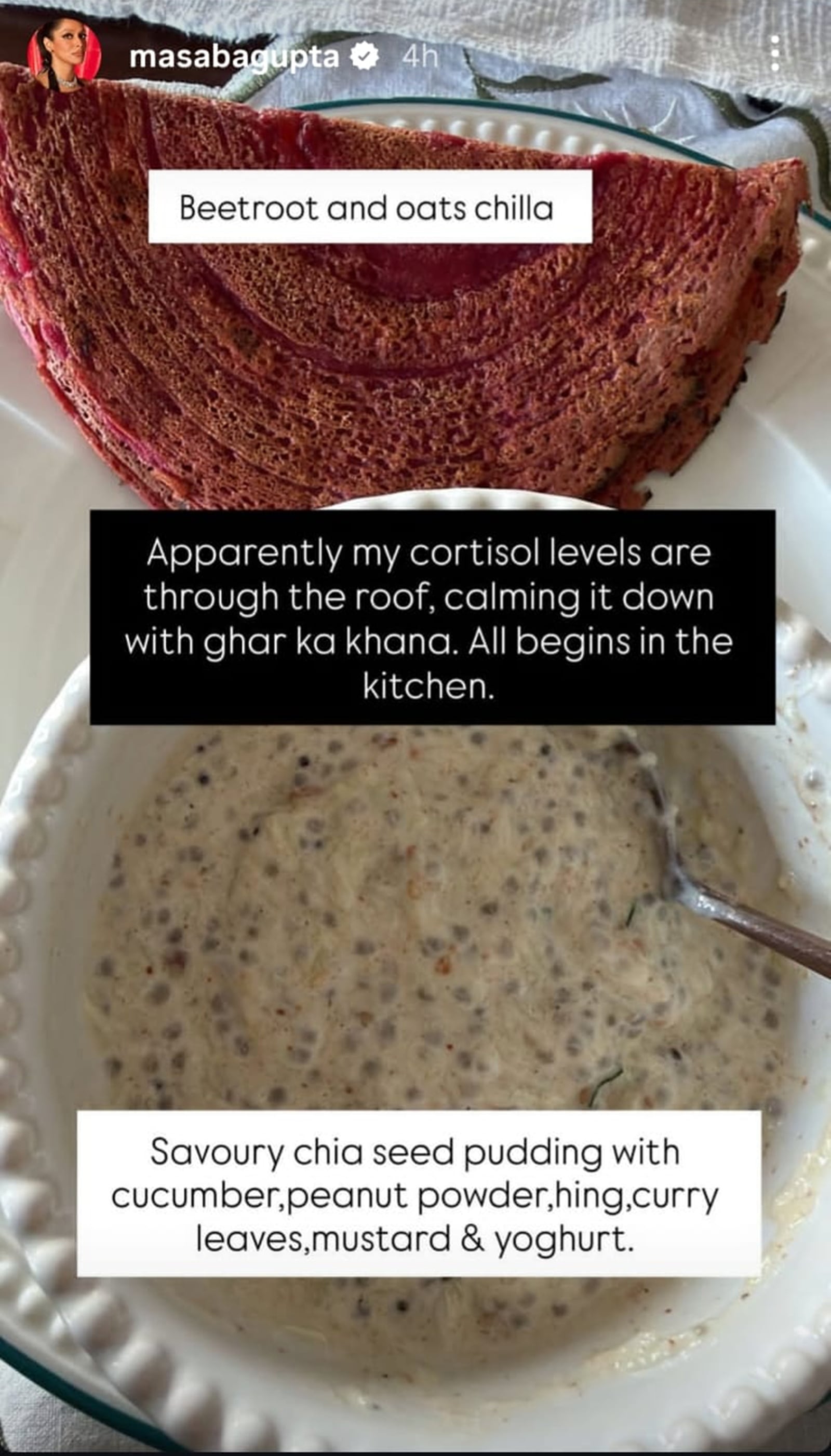📣 For more lifestyle news, click here to join our WhatsApp Channel and also follow us on Instagram
Masaba Gupta shares health update, says ‘cortisol levels are through the roof’: ‘All begins in the kitchen’
Taking a cue from her admission, let's understand what cortisol level is, what happens when it is elevated and if home-cooked food can help.
 Masaba Gupta says her cortisol levels are on the higher side (Photo: Masaba Gupta)
Masaba Gupta says her cortisol levels are on the higher side (Photo: Masaba Gupta)Fashion designer Masaba Gupta, 35, recently posted a health update stating that her cortisol level is extremely high while also sharing what she has been doing to tackle it. “Apparently, my cortisol levels are through the roof. Calming it down with ghar ka khaana. All begins in the kitchen,” Masaba wrote on Instagram Stories alongside a picture of her plate, which comprised beetroot and oats chilla, savoury chia seeds pudding with cucumber, peanut powder, curry leaves, hing, mustard seeds and yoghurt.
Taking a cue from her admission, let’s understand what cortisol level is, what happens when it is elevated and if home-cooked food can help.
Cortisol is the body’s main stress hormone, which helps us stay alert and energetic. “However, when levels stay high for too long, it can disrupt other hormones. Many women experience fatigue, mood changes, irregular or delayed periods, and sleep issues due to prolonged stress,” said Dr Richa Bharadwaj, consultant, Obstetrics and Gynaecology, Wockhardt Hospitals, Mumbai Central.
Does what we eat actually influence cortisol levels?
Yes, affirmed Dr Bharadwaj. “Food plays a significant role in regulating our stress response. Refined sugars, too much caffeine, and skipping meals all keep cortisol levels high,” said Dr Bharadwaj.
In contrast, balanced meals with good proteins, healthy fats, and complex carbs help stabilise blood sugar and calm the nervous system, which naturally lowers cortisol, as mentioned by Dr Bharadwaj.
 Masaba Gupta shares a glimpse of what she is eating (Photo: Masaba Gupta/Instagram Stories)
Masaba Gupta shares a glimpse of what she is eating (Photo: Masaba Gupta/Instagram Stories)
Do dishes like beetroot-oats chilla and savoury chia pudding with yoghurt and cucumber help?
Calling them “smart choices”, Dr Bharadwaj said oats help regulate blood sugar, beetroot improves blood flow, and chia seeds provide magnesium and omega-3s, both known to reduce stress. “Yoghurt supports gut health, which also helps improve mood regulation. This shows how traditional home-style food can be both comforting and healing,” said Dr Bharadwaj.
What should women watch out for if their stress levels are constantly high?
Dr Bharadwaj listed persistent exhaustion, cravings for sugar or salty foods, hair loss, irregular cycles, and difficulty sleeping as signs that could indicate cortisol may be out of balance. “The solution starts with basics: mindful eating, getting enough sleep, staying hydrated, and taking short breaks throughout the day. Ultimately, managing stress isn’t about complicated diets; it’s about consistency, balance, and care that begins in your own kitchen,” said Dr Bharadwaj.
DISCLAIMER: This article is based on information from the public domain and/or the experts we spoke to. Always consult your health practitioner before starting any routine.
📣 For more lifestyle news, click here to join our WhatsApp Channel and also follow us on Instagram





- 01
- 02
- 03
- 04
- 05






















